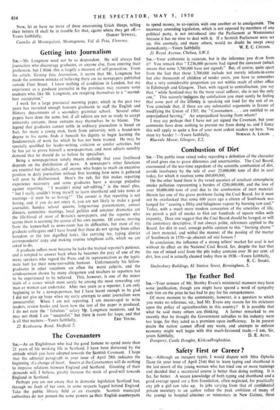Getting into Journalism SIR,—Mr. Longmate need not be so despondent.
He will always find journalists who discourage graduates, or anyone else, from entering their
profession, but I think this is largely a measure of self-protection. From
his article, Getting Into Journalism, it seems that Mr. Longmate has made the common mistake of believing there are no newspapers published
outside Fleet Street. I know nothing of conditions in London, but my experience as a graduate journalist in the provinces may reassure some students who, like Mr Longmate, are resigning themselves to a " second- best occupation."
I work for a large provincial morning paper, which in the past two years has recruited enough honours graduates to staff the English and History departments of a secondary grammar school. Several other papers have done the same, but, if all editors are not so ready to accept university entrants, those entrants may themselves be to blame. The
legend that graduates cannot settle in ordinary journalism is based on fact, for many a young man, fresh from university with _a brand-new degree to his name, finds it beneath his dignity to begin learning the fundamentals of work for which he has not been trained. He may be specially qualified for leader-writing, criticism or similar activities, but he has yet to prove himself a newspaperman, and most editors sensibly demand that he should do so before he specialises.
Being a newspaperman simply means realising that your livelihood depends on the distribution of news. A newspaper's other functions are essential but subsidiary, and anyone who hopes to reach an executive position in daily journalism without first learning how news is gathered will soon be disillusioned. Here's the rub, for this makes reporting experience necessary. and some graduates have a strange prejudice
against reporting. I wouldn't mind sub-editing," is the usual plea, " but I really couldn't bring myself to learn shorthand and take notes at meetings—it must be so boring!" The answer is that reporting is not boring, and, if you do not enjoy it, you are not likely to make a good journalist. Sunday school queens, long-service presentations, annual dinners, committee meetings, local politics and amateur dramatics are the life-blood of most of Britain's newspapers, and the reporter who scorns them is scorning the source of his own income. Of course, moving from the lecture-hall to news-room has its difficulties, but most of my graduate colleagues and I have found that these do not spring from either boredom or the less dignified tasks, like carrying tea, typing district correspondents' copy and making routine telephone calls, which we are asked to do. A graduate suffers most because he lacks the trained reporter's patience, and is tempted to answer back when he becomes the prey of one of the many speakers who regard the Press and its representatives as the legiti- mate butt for their none-too-subtle humour. Unfortunately his fellow- graduates in other vocations are often the worst culprits, and the condescension shown by many clergymen and teachers to reporters has to be experienced to be believed. This, however, is one of the minor trials of a career which must surely be among the most rewarding any man or woman can undertake. After two years as a reporter, I am only beginning to be a newspaperman, but I have learnt enough to be glad I did not give up hope when my early attempts to enter journalism were unsuccessful. When I am not reporting, I am encouraged to write leaders, review books and learn how the rest of the paper is produced. I do not earn the " fabulous " salary ?qtr. Longmate mentions, and he may not think I am "successful," but there is room for hope, and that






































 Previous page
Previous page